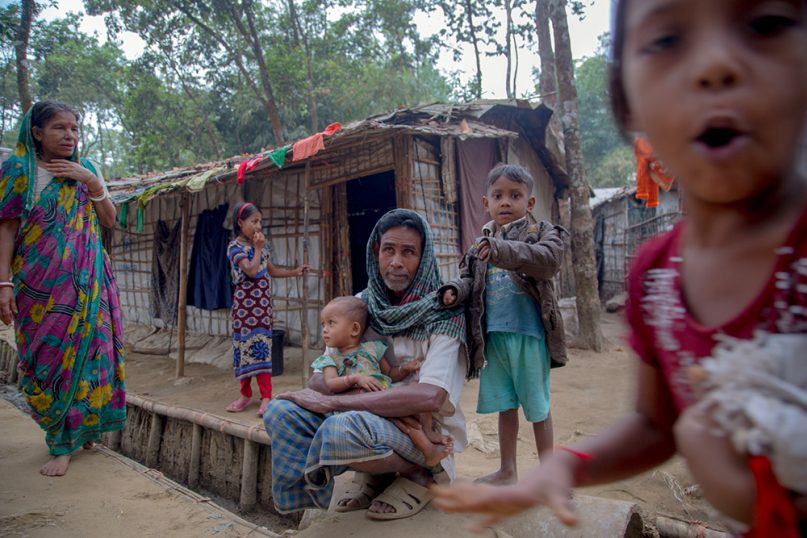(RNS) — Liberal religious voters and activists have been unusually visible this election season, helping stage protests and candidate forums to voice both their outrage with the Trump administration and their hopes for those policies the 2020 Democratic presidential field will embrace.
With CNN hosting two Democratic debates this week on Tuesday and Wednesday (July 30-31), left-leaning people of faith will likely be among those watching with interest.
So what will this increasingly vocal and politically influential group be looking for? Here are a few issues they are likely to keep an eye on.
1. Treatment of immigrants
Religious leaders and groups have been among the harshest critics of President Trump’s immigration policies, with people of faith repeatedly condemning the administration’s travel ban, threat of deportation raids, separation of migrant families along the U.S.-Mexico border and the detention of migrant children. A few dozen liberal congregations are housing immigrants at risk of deportation in their buildings as part of the New Sanctuary Movement, effectively daring Immigration and Customs Enforcement to violate its own informal policy of not raiding churches, schools and hospitals.
Their activism has led to several direct confrontations with the Trump administration. In November 2018, police arrested 27 people in North Carolina — most from the same church, including the pastor — after they surrounded a van in which ICE officials had detained an undocumented immigrant who had been living in the basement of CityWell Church (he had briefly left to attend a meeting with immigration officials).
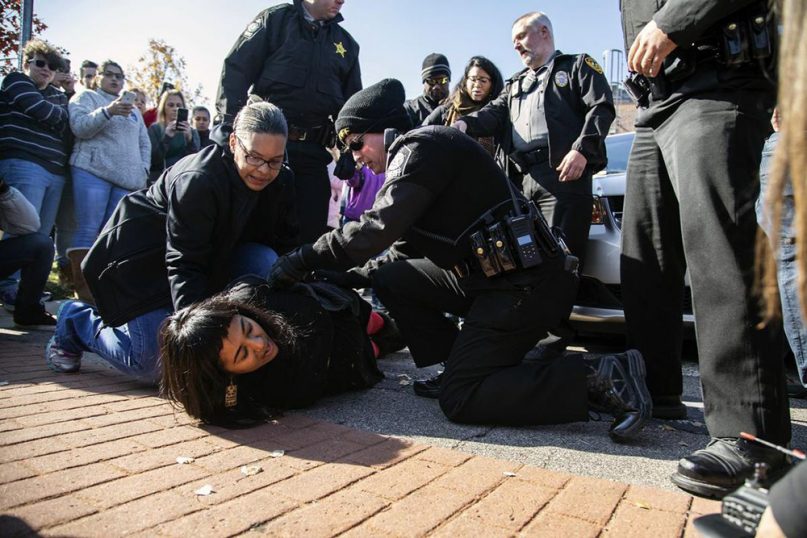
A demonstrating church member is arrested after Samuel Oliver-Bruno, 47, an undocumented Mexican national, was arrested after arriving at an appointment with immigration officials, in Morrisville, N.C., on Nov. 23, 2018. He had been living in CityWell United Methodist Church in Durham since late 2017 to avoid the reach of immigration officers, who generally avoid making arrests at churches. (AP Photo/Travis Long)
In March, the Rev. Kaji Douša learned she was on a list of immigrant rights activists who were being tracked and scrutinized by the U.S. government (she has since filed a federal lawsuit accusing the administration of violating her religious liberty). And just this week, hundreds of faith-based demonstrators organized by the Poor People’s Campaign descended on El Paso, Texas, to demonstrate outside a detention center that houses immigrants.
Several 2020 Democratic candidates such as Sen. Kamala Harris and Sen. Kirsten Gillibrand have already made reference to faith when discussing immigration issues, and South Bend, Ind., Mayor Pete Buttigieg did so in his last debate appearance. With so much frustration in faith communities over the government’s treatment of immigrants, liberal religious voters will likely relate to candidates who voice similar outrage during CNN’s debate.
2. Refugees
A variety of faith groups have opposed the Trump administration’s decision to dramatically reduce the cap on refugee admissions, which currently sits at 30,000 — the lowest number since the current iteration of the refugee resettlement program began in the 1980s. The refugee resettlement program itself, which operates as a partnership between the federal government and nonprofit groups, is already largely religious: Of the nine groups that help resettle refugees, six are faith-based organizations that rely on congregational funding and volunteers.
Those programs have already been decimated under Trump, with groups being forced to close offices and lay off employees — some of whom are refugees themselves — due to the reduction in refugee admissions. With the government now reportedly mulling the possibility of reducing the refugee admissions cap to zero next year, religious groups are speaking out about a policy they say violates their religious call to welcome those in need.
Democratic 2020 candidates have thus far mostly spoken of refugees in tandem with immigration overall, but liberal religious voters may be looking for candidates to speak directly to the issue this go-round.
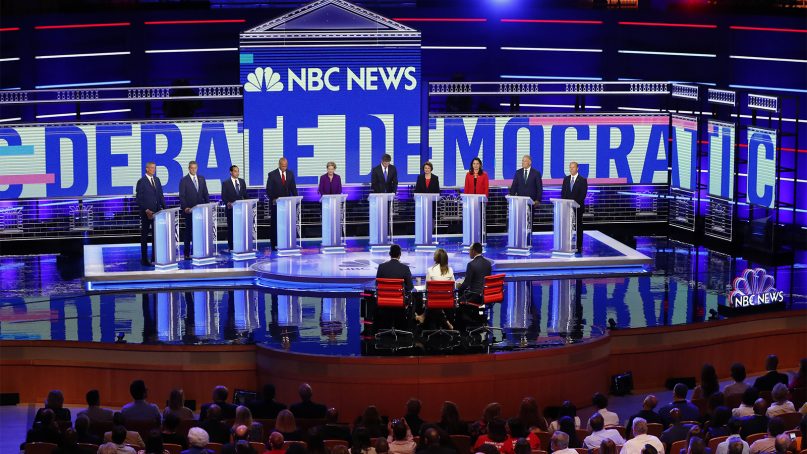
Democratic presidential candidates participate during the Democratic primary debate hosted by NBC News at the Adrienne Arsht Center for the Performing Arts on June 26, 2019, in Miami. (AP Photo/Wilfredo Lee)
3. Climate change
Concern for the environment and the need to curb global climate change has been a mainstay among religious communities for some time.
A 2014 Pew Research poll revealed that black Protestants and Hispanic Catholics were already more likely than most other religious demographics to say that global warming is not only real, but caused by human activity. Progressive and indigenous activists from across the country descended on North Dakota’s Standing Rock Sioux Reservation in 2016 to participate in the protests against the Dakota Access Pipeline, an overtly spiritual movement led by Native Americans. And in 2015, the release of Pope Francis’ “Laudato Si'” — an encyclical dedicated to environmental concerns — helped establish climate change as a top religious issue.
The fusion of faith and environmentalism has only persisted under Trump. Religious groups helped organize the People’s Climate March, and Rep. Alexandria Ocasio-Cortez — who attended the Standing Rock protests — has invoked Christian Scripture when defending her call for a Green New Deal, legislation that would protect the environment.
Liberal voters are already clamoring for a dedicated debate on climate change, with major networks such as CNN and MSNBC recently announcing forthcoming televised forums on the subject (MSNBC’s is in partnership with Georgetown University, a Catholic school). Lefty religious voters appear equally interested.
4. Poverty
Concern for the poor is a foundational concept for many religions, and modern liberal religious voices have taken up the cause with gusto.
Sister Simone Campbell, head of the Catholic social justice lobby Network, has spent years touring the nation — and sparring with Republican lawmakers — while calling for policies that would assist the poor. She has continued to trumpet the cause under the Trump administration, as has the rapidly expanding Poor People’s Campaign, led by the Rev. Liz Theoharis and the Rev. William Barber II.
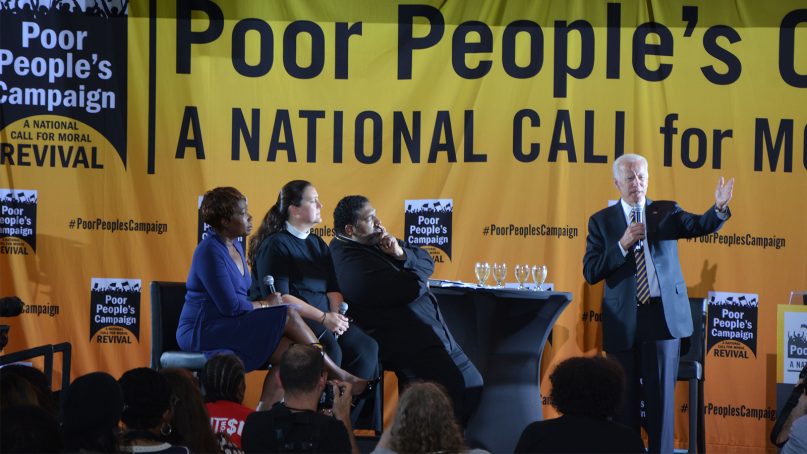
Presidential candidate Joe Biden, right, addresses a Poor People’s Campaign meeting at Trinity Washington University in Washington, D.C., on June 17, 2019. RNS photo by Jack Jenkins
The Poor People’s Campaign even hosted its own candidate forum in June that featured appearances by nine presidential hopefuls — including former Vice President Joe Biden and Sens. Elizabeth Warren, Bernie Sanders and Kamala Harris, among others. Barber and the candidates repeatedly tied the broader issue of poverty to other, narrower concerns such as health care, voting rights, gerrymandering, systemic racism and climate change, lifting up the larger issue of poverty as a framework through which to envision a slate of liberal policies.
Every candidate at the forum pledged support for a dedicated debate on the topic of poverty, usually triggering applause from the audience. With that in mind, liberal people of faith will likely be watching to see if the moderators — or the candidates themselves — bring up the issue this week at the debates.
5. Capital punishment
The death penalty is a persistent concern among many faith communities, with millions of Americans opposing it on religious grounds. Even so, while it is sometimes raised in political settings — the topic was discussed during the 2016 vice presidential debate between then-Indiana Gov. Mike Pence and Sen. Tim Kaine — it has rarely emerged as a major campaign issue in contemporary election cycles.
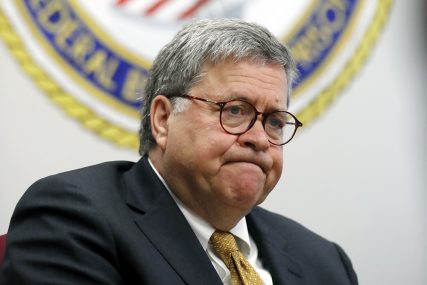
Attorney General William Barr speaks during a tour of a federal prison in Edgefield, S.C, on July 8, 2019. The Justice Department says it will carry out executions of federal death row inmates for the first time since 2003. The announcement Thursday says five inmates will be executed starting in December. (AP Photo/John Bazemore)
Recent events may change that, however. Polls show a widening partisan gap on capital punishment, with 77% of Republicans favoring it for people convicted of murder, compared with 35% of Democrats. What’s more, when Attorney General William Barr announced last week the Trump administration would resume federal executions after a 16-year moratorium, not only did the Religious Action Center of Reform Judaism, Mennonite Church USA and Catholic leaders such as death penalty abolitionist (and Catholic nun) Helen Prejean reaffirm their stances against the death penalty, Democratic candidates were also quick to voice their opposition.
Some, such as Warren and Sen. Cory Booker, said the death penalty disproportionately targets poor people and minorities. Others pointed out how little it does to deter crime, how much it costs taxpayers and how a number of people sentenced to death have later been exonerated. Harris called the practice “immoral” in a tweet; Sanders called for it to be abolished.
(Emily Miller contributed to this report.)
